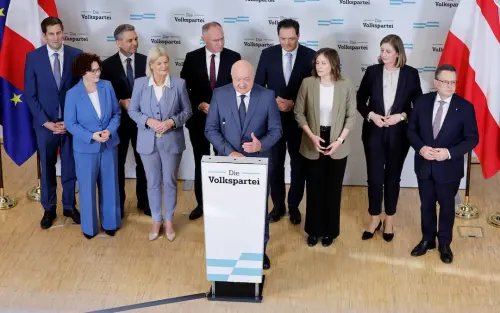VIENNA, Feb 28 (Reuters) - Austrian political parties aiming to form a government excluding the far right unveiled their future ministers on Friday. Notably, they introduced the first left-wing finance minister in 25 years in preparation for a crucial vote to finalize the agreement on Sunday.
The conservative People's Party (OVP), Social Democrats (SPO), and liberal Neos revealed their choices on Thursday. This move came five months after the eurosceptic, Russia-friendly Freedom Party (FPO) secured almost 29% of the vote in September's election.
The incoming government is scheduled to commence operations on Monday. Prior to this, the Neos are subjecting the agreement to a vote among their members in Vienna, requiring a two-thirds majority for approval. Failure to secure this majority would exclude the Neos from the coalition, leaving the other two parties with just a one-seat majority.
Following the FPO's withdrawal from coalition talks two weeks ago, the three parties rekindled efforts to form a government, opting to steer clear of a potential snap election that polls indicated would further bolster the far-right party's position.
The government's leadership will fall under the OVP and its new 64-year-old leader, lawyer Christian Stocker. The SPO is set to lead the justice and finance ministries, while the OVP will oversee the interior, defense, and economy portfolios. The Neos are slated to assume responsibilities for foreign affairs and education.
The SPO's nominee for finance minister, 60-year-old economist Markus Marterbauer, is expected to refashion Austria's budget "in a balanced and socially equitable manner," as outlined by party leader Andreas Babler, who is poised to become the vice chancellor.
Babler stated, "He will ensure that we do not blindly save our way into a crisis, but rather invest our way out of it."
The coalition agenda places significant emphasis on narrowing the budget deficit to meet the European Union's 3% economic output limit.
Measures to achieve over 6.3 billion euros ($6.6 billion) in savings this year involve increasing taxes on banks and extending levies on power and energy companies.
($1 = 0.9607 euros)
